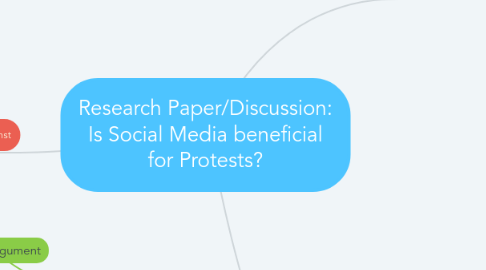
1. Arguments against
1.1. Social Media seems to be doing more to enable Westerners and reputed journalists around the world to raise their voice about a particular event, and pass on information about protests quickly. However, these tweets or emails do not seem to help those who are actually fighting within the country. If the social media feed were to be used for organising protests, why would it be English? Example, the Iranaian revolution in 2009.
1.2. Social Media protests are not as strong as in-person protests. In person protests, like the 13month long Montgomery Bus boycott that began with Rosa Parks took a lot of decision making, a lot of planning, and a lot of social connections formed by face-to-face interactions. These face-to-face, neighbourly interactions are a lot more important in ensuring that a movement sustains overtime. These face-to-face interactions are also dangerous and that is why fascists countries around the world often limit public gatherings.
1.3. Social Media was used more as a tool for organising protests than as the cause of the revolution. However, when these protests failed, like in Egypt where the country was eventually under the rule of yet another repressive government, social media becomes the tool for misinformation and online hate crimes.
1.4. One could argue that none of the protests that used Social Media to mobilise people have been successful.
2. Historical/Current Events Context
2.1. 2009 Iranian Green Revolution
2.1.1. The 2009 Iranian protests started because President Mahmoud Ahmadinejad won the presidential elections despite several irregularities in the election process. The protests were in support of the President Ahmadinejad's opposition: Mir-Hossein Mousavi and Mehdi Karroubi
2.1.2. Also called as the "Twitter Revolution", The Iranian protests in 2009 became a world event because of the use of Twitter by protesters on the streets in Iran. The twitter feeds brought to the forefront the political turmoil in Iran following the 2009 election.
2.2. Egyptian Revolution of 2011
2.2.1. Also known as the January 25 revolution. This revolution was against President Hosni Mubarak, and acts of police brutality under his rule. There were different types of protests in this revolution including civil disobedience, and peaceful marches.
2.2.2. The revolution was also started with Twitter and Facebook, where people were asked to gather in Cairo's Tahrir Square to protest police brutality in the nation. The full impact of the protest was realised when people gathered at the square.
2.3. Hong Kong Protests 2019
2.3.1. The Hong Kong protests in 2019 started to prevent Hong Kong from merging into China under one common law. So far, Hong Kong was considered to be separate state within China with its own rights and privileges.
2.3.2. The Hong Kong protests also used Social Media to protest against the common law that was to be imposed on them. However, the Hong Kong Social Media protests were used for a variety of other reasons including keeping one's identity anonymous so as to prevent being arrested, organising rallies and marches, documenting the protest for the rest of the world to see.
